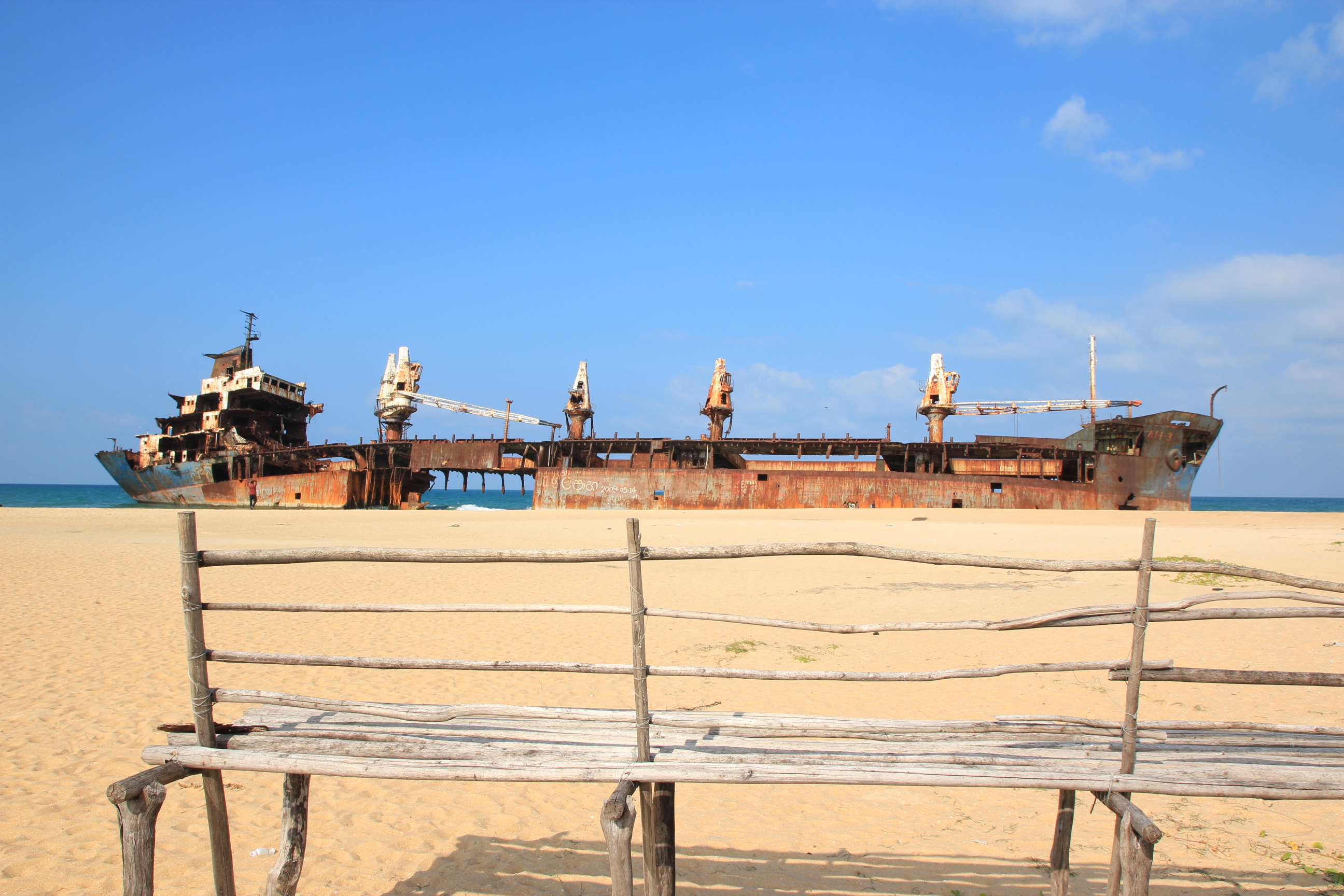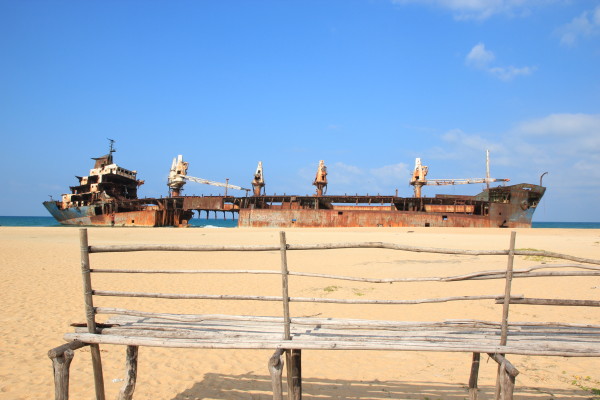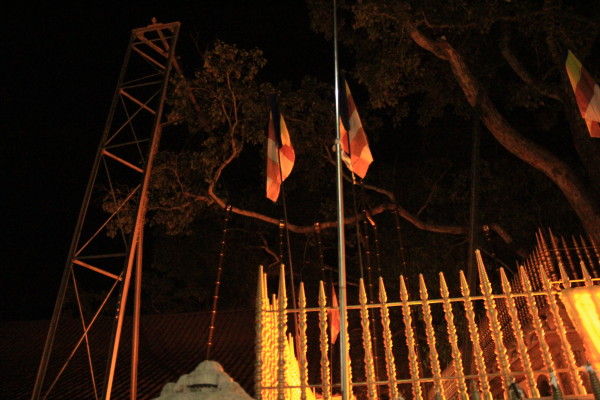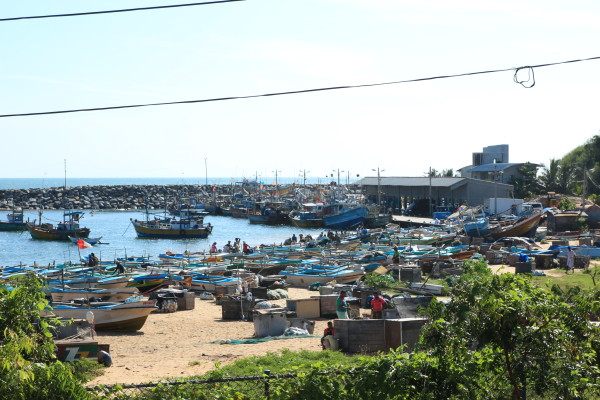[In 2009, the decades-long civil war in Sri Lanka between the terrorist LTTE or Tamil Tigers and Sri Lankan Government finally ended, but left behind a legacy of war that endures, further complicated by global climate change. In 2012, Johnny C traveled there to cover the forces of war, globalization, and climate change. Some names and organizations have been changed to protect the identities of those who participated in the events of this series.]
There was a strange beauty in the decay of the Farah 03 as the Jordanian ship seized by the LTTE as it sat there on the silent Indian Ocean under the blue sky. It was like an image out of one of my many post-apocalyptic science fiction novels, one that showed man’s own insignificance as his inventions outlive him but only become part of the landscape due to his hubris. The LTTE had stripped Farah bare, but she outlived them and had a strange but haunting beauty that summoned the few who made it up to the northern tip of Sri Lanka like a siren’s call, to witness the oblivion brought upon the LTTE by themselves.
As I crossed shanty towns and cannibalized buses, cars, trucks, and other vehicles in a graveyard of machines, children ran barefoot amidst the shrapnel and broken glass and metal piles. Some people couldn’t leave their homes, other people had nowhere else to go. Across barbed wire, sarongs and trousers hang and dry in the sun as they flap in the wind while we drive past the bullet-ridden buildings and discarded papers and small fires burning in the dry grass near sheet metal huts. I cross through several of these on my way to a building to take pictures of where some new facilities will be built only to be yelled at (again) and told that there are still live explosives there, because the area had not been certified as having been fully checked out to be safe.
We drove past these and the other museum of the naval weaponry used by the Tamil Tigers to fight the Sri Lankan Army in less than one hour, but the images stayed in our heads for the rest of the eight hours we spent returning to Colombo. It was on our way to Colombo that the driver recommended I see the Bodhi Tree Temple, where one of the branches of the very tree the Buddha had awakened under was carried to Sri Lanka and kept to honor him, while the temple became a sacred site that Tamil and Sinhalese alike went to see. The spot was so sacred that even outside the gates for a quarter kilometer, I had to remove my shoes and walk barefoot before even reaching the temple itself, and it was in going there and feeling the sudden change in the air of recovery to a sudden nihilistic-yet-stoic type of Zen calm dismissing the futility of existence while embracing Nirvana that permeated through all of the space there. It was precisely that calm I would need to survive the sudden December floods that displaced people we had come to help and prevented us from getting to any of the places we were supposed to go to due to the water levels and bad roads.
The next few days were spent near Hambantota (in the southern part of the island) where it was the worst-hit by the tsunami, holed up in a damp hotel room, unable to leave and barely able to eat beyond what was stockpiled in the hotel already. Under the flickering lights of the lobby amidst another flood of beetles and mosquitoes, I drank ginger beer and bottled water while chewing on prawns and observing how hard this part of the island is affected by rain. I think of how it was worse when the tsunami came, and how the rising tide levels thanks to global climate change make this kind of flooding comes closer to being the norm every year, cutting people off from one another and preventing growth of food or transportation of supplies around the country.
“This is why we embrace Buddhism in Ceylon [Sri Lanka], young man: joyous celebration in shared suffering, for we wouldn’t be able to survive without this attitude” said the hotel manager. For what little I could do with a camera and my writer’s insight, I got the better end of the deal doing my volunteering and consulting bit here with the inspiration that came from the locals and their effortless ability to persevere even as the elements and humanity tested everyone’s mettle in Sri Lanka.
I look at the natural toilets (the open air, bushes and trees) and squat pits people had, the meager food they would eat but still share with strangers as malnutrition still persists amongst some families, the sheet metal huts that offered shade in the day and a place to sleep under the clearest view of the stars every night. As always with every other country I’ve been deployed to for my work in humanitarian aid and development, I am constantly impressed by humanity’s ability to make the most out of its situations, for better or for worse, especially for those with very little. As I spent my second-to-last night looking at the night sky in a very Carl Sagan moment, I realized they have the same thing I do: the stars shine over everyone, rich and poor, young and old, and knowing this, how hard is it to have even a moment of a little appreciation even when life seems to be against you, your family, your community, country, and species? Life is good and abundant to you, life is bad and takes away from you, the stars are all still there, and it’s the same sky the widow, the orphans, and me were all looking at that night no matter where we were on the island, no matter what language we spoke, no matter what we were feeling at that moment in life. This is exactly why Arthur C. Clarke moved to Sri Lanka and never returned to Britain afterwards, I bet (not to mention the great scuba diving).
It was one of those moments in reflection I would need to keep me sane as I was holed up for several days attempting to drive to each site for work only for the sudden heavy rain floods to be hindering our progress. There’s something to be said about being in a damp car with the air conditioner at full blast, and the storms being so heavy you couldn’t see beyond more than a few meters ahead, which is a momentary discomfort interrupted by our car abruptly skidding across the only road and nearly into the lake.
“I’ve seen weirder and survived more the past few days anyway,” I thought as our car nearly hit the edge, “another bard song for when it’s over.” In this line of work, the dangers to life and well-being are the fun part, the boredom between those moments are not.
End of Part 3
- Previous: Strange Serendipities in Ceylon (Part 1)
- Previous: Strange Serendipities in Ceylon (Part 2)
- Coming up next week: Strange Serendipities in Ceylon (Part 4)











